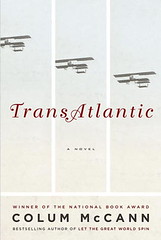 Transatlantic
Transatlantic
Colum McCann
![]()
Two Englishmen fly the Atlantic from Newfoundland to Ireland in 1919. Fredrick Douglass, a slave turned abolition activist, tours Ireland in the mid-1800s. A maid who works for the family who hosted Douglass emigrates to the United States during the famine. A retired US senator flies back and forth between the US and Ireland during the Clinton administration, trying to help the various Irish factions agree to a ceasefire and truce. The daughter of that earlier Irish immigrant grows up to become an reporter. Before her mother dies, the two women go to a lecture given by Fredrick Douglass, now an old man. Much later, now a middle-aged woman herself, she interviews the British aviators in Newfoundland just before they take off on their famous flight. She and her daughter, who was also there for the 1919 flight, visit Ireland in the 1940s to interview the surviving trans-Atlantic aviator. The daughter marries an Irishman and has a son. The son is murdered during the Troubles. Now an old lady herself, the granddaughter of the immigrant maid looks back on her life and all the connections that unify this expansive, emotional novel.
The characters live. The writing is beautiful without being pretentiously poetic. No lengthy exposition; rather, characters interact as real people living real lives, and their words place us fully in their world. This is great writing.
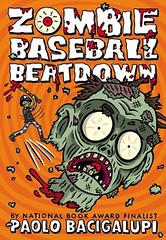 Zombie Baseball Beatdown
Zombie Baseball Beatdown
Paolo Bacigalupi
![]()
As an adult who loves the dystopian fiction Paolo Bacigalupi writes for older YA readers, I found this one, written for a much younger audience, a letdown. Would I have liked it more if I were a pre-teen reader? Most likely.
The story is silly, filled with zombie movie cliches (except for the one about shooting them in the head, which doesn’t work here). I was reminded of Carl Hiaasen’s youth books in that Bacigalupi tries to get his young readers thinking about important social and ecological issues: unsafe food, low wage jobs, immigration, class, poverty. But by the time I was halfway through the book I felt like Bacigalupi was flogging those issues too hard and too repetitively.
There were several instances where the characters’ actions and dialog didn’t make sense in the context of what was happening at the time — during a zombie attack, for example, the three kids might spend three pages talking to each other about what they’re going to do to get out of it alive, when any kid with a lick of sense would have taken off running paragraphs ago.
Bacigalupi’s storytelling here is too padded for my adult tastes. I don’t know if a younger reader would have the same reaction, but I suspect he might find the action a little slow in places, and perhaps even feel as if he’s being talked down to. And then there’s the end. I don’t want to spoil things for anyone, so I’ll just say it felt like a cheap trick.
I’m certain Paolo Bacigalupi fans will agree with me on this: we long to return to the world of Ship Breaker and The Drowned Cities. This is where Paolo Bacigalupi is at his best, writing for an older YA and adult audience.
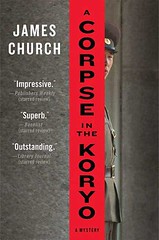 A Corpse in the Koryo (Inspector O #1)
A Corpse in the Koryo (Inspector O #1)
James Church
![]()
I heard about this series and immediately ordered A Corpse in the Koryo, the first book in the Inspector O series, from my local library. North Korea fascinates me; this book promised an inside look at that forbidden country and the lives its citizens live. To a large degree, it delivered. By that I don’t mean to imply it fell short: James Church gives us a decent look at the life of a mid-level functionary in Pyongyang, a non-political police inspector who is drawn into a feud between a civilian intelligence agency and military intelligence, a man who knows and accepts his place in a bizarre Stalinist society where virtually everyone permitted to live and work in the capital city is involved in politics to one degree or another. It’s not a highly detailed look, but I expect other books in the Inspector O series will add levels of detail to what I learned here, and I do intend to read those books.
What James Church does with Inspector O is almost identical to what Martin Cruz Smith does with Detective Arkady Renko. That’s not meant as a put down — if you’re as morbidly curious about North Korea as I am, you’ll welcome a North Korean Arkady Renko.
This novel definitely scratched an itch, and I want more. James Church and Instpector O are on my list now.
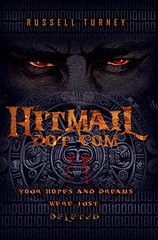 Hitmail dot com
Hitmail dot com
Russell Turney
![]()
Some time back I was contacted by the author (we do not otherwise know one another), who asked for technical advice on a part of the narrative involving F-15 fighters. I was happy to do it, and after sending him my suggestions he said he’d send a copy of the book when it was published. And so he did. It took me a while to get around to reading it — when I did I was simultaneously reading three other books, but there was no danger of getting this one confused with the others.
Hitmail dot com is not at all what I expected after editing the short section the author sent me. I thought the scene where two Oregon ANG F-15 pilots were vectored against another aircraft had something otherworldly about it, but took it for science fiction — an alien craft showing up on air defense radars, perhaps.
Hitmail dot com goes in another direction. Yes, there’s a Gibsonesque cyber subplot about a computer game. Other parts of the story would be at home in the espionage, action thriller, and romance genres. But the tale itself centers around gods and demons and an earthly woman who is also part Lemurian (and also the pre-ordained slayer of said demon).
In other words, it’s absolute horseshit. Hippie-dippy mystic crystal revelation horseshit, with devils. Russell Turney doesn’t even try to make it plausible, he just runs with it, as if it would be perfectly normal to live in a universe where a small number of gifted people can pass back and forth between the world we know and a supernatural one. But hey, that’s what J.K. Rowling does, and look where it’s gotten her.
I grumbled to myself about the silliness of the story but wound up reading it all the way through. Despite my total lack of interest in the supernatural elements of the story, and a few typos that should have been edited out but weren’t, I felt compelled to keep turning pages, to find out what happened next. Turney has a gift. I’d like to see him try his hand at a conventional espionage or thriller novel — I’d read it.
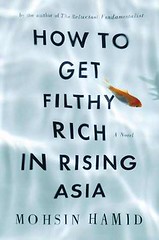 How to Get Filthy Rich in Rising Asia
How to Get Filthy Rich in Rising Asia
Mohsin Hamid
![]()
I liked it. I liked it a hell of a lot. Reading a novel written in the second person is kind of a one-time thing — I certainly hope this novel doesn’t spark a surge in second-person narration — but How to Get Filthy Rich in Rising Asia made me feel connected to the life of the man Mohsin Hamid writes about, connected as well to the secondary characters, Mohsin Hamid himself, even Hamid’s other readers. I felt something similar to what I felt while reading Cloud Atlas: a eureka-style perception of the interrelatedness of human lives, a desire to comprehend that oneness more fully, the feeling that I am part of something much larger than myself and my immediate family and friends.
The story the novel relates is a simple one, but it encompasses the cycle of life from birth to death, and does it in an intimate way — without ever giving a name to a single character, city, or country. That’s a neat trick.
Your mileage may vary, as they say; reading other reader reviews confirms this. But I liked it, as I say — a hell of a lot.
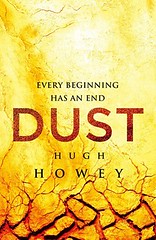 Dust (Silo #3)
Dust (Silo #3)
Hugh Howey
![]()
I should tell you that four stars is about as high as I ever go, Patrick O’Brian and a few other exceptional authors excepted. So when I rate Dust — in fact the Silo trilogy as a whole — at four stars, you must understand that I’m as giddy as a pimply-faced boy who just scored a date to the prom.
I was fascinated by the Silo series. I suppose I could go into a thing about Hugh Howey rewriting Plato’s allegory of the cave for a modern audience, but that would be getting carried away.
Howey crafted this story perfectly, I think. Other writers might have tried to explain too much. By focusing on ten or so individual characters with limited knowledge and only vague notions of the outside world, by confining the action to just three of fifty silos, Howey gives us room to flesh things out ourselves, to supplement what he chooses to tell us with our imaginations. I would almost hate to see these stories made into a movie — but I’d love to listen to them as radio plays, like the ones that enthralled audiences in the 1930s and 40s.
I see, looking at other reviews, that readers want more. If Hugh Howey continues with the Silo saga I will surely read it, but I think he ended on a high note and more would be overkill. Besides, I have hundreds of other books to read, and I appreciate the break, because if he wrote another Silo story I would have to put it at the head of the line, neglecting everyone else.